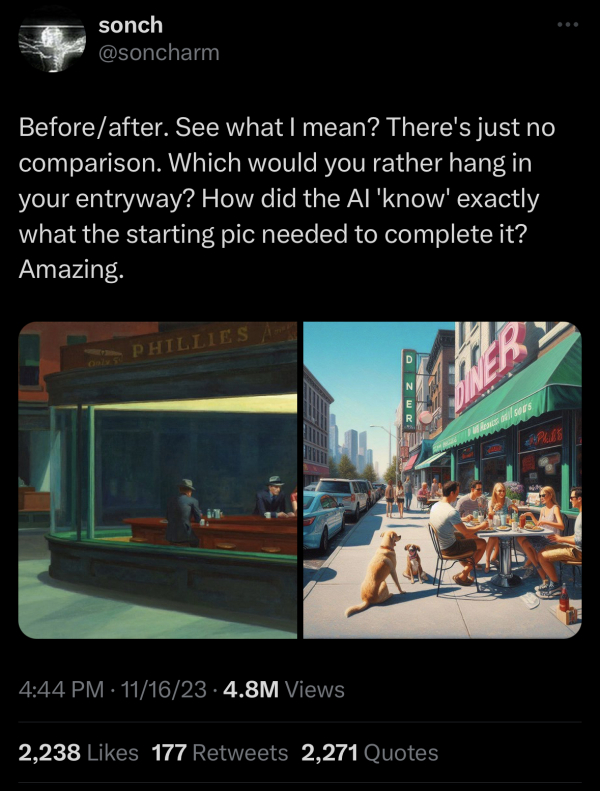Have you listened to the new Beatles song? It took almost 50 years and new technology to create.
How did this happen? An AI system, made by Peter Jackson, uncoupled the vocals from the piano on a poor-quality tape demo from the 70s. The result – a song that would have never seen the light of day was able to bring John Lennon back from the dead to release new music for a new generation.
You can listen to it here.
via The Beatles
Was it a touching tribute and closure to an extraordinary legacy? Does it qualify as AI "art"?
We are seeing a surge in creativity due to the rise of generative AI.
People are doing amazing things with AI … and it's making entrepreneurship accessible to a new group of people.
AI is exciting, but it is also scary. I would argue that it is a net positive. However, there are also clear drawbacks (and potential risks). For example, there are the obvious ones like deepfakes, art being stolen and fed into models without consent, etc. But, there's one that many aren't talking about…
It's a lack of nuance or understanding of art.
Here is an example of using generative AI to improve a famous art piece.
In my opinion, the creator completely missed the point when they tried to improve Nighthawks by Edward Hopper.
The truth is that I don't know their intent or thought process.
However, Nighthawks is famous for a reason. It shows a patron, presumably at a late-night diner, with a desolate urban streetscape outside. To the right audience, it embodies the isolation of a 24-hour modern society and big cities, and the hidden changes of the 20th century. It is a poignant composition and one of the most famous American art pieces.
Lost in the power of Generative AI, this X (Twitter) user transformed the piece by running it through an art processor multiple times.
First, he had AI parse the image and write a description of it. Then, he had it regenerate the image from the description. The setting became light. He thought he could make it better, so he moved people outside. He parses a description again and creates a new image again. He did this several times.
The result is what you see — a beautifully created composition lacking any depth.
The AI did its job; the human did not.
A better prompt or a more artful process would have had a better result.
But is it art?
Once created, art is in the eye or mind of the perceiver. So, should we care who or what creates it?
Here are some other questions worth pondering. Is AI at its best when it's amplifying human intelligence – rather than replacing it? Or … is the goal simply to amplify intelligence?
The Universe often gives you increasingly painful chances to learn a lesson.
What do you think we're supposed to take from this?


Leave a Reply